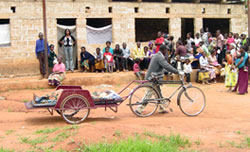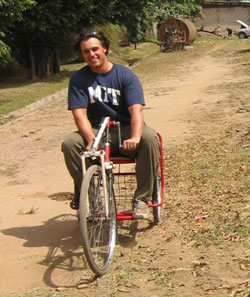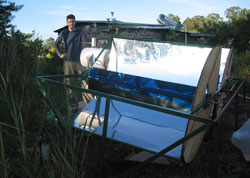
| Vol.
XIX No.
1 September / October 2006 |
| contents |
| Printable Version |
International Development Fair Showcases
Students' Global Development Experiences
Think back to your undergraduate years. Where in the world were you? On campus, mostly? A semester in England or Spain, perhaps? Here’s how some of our undergraduates are spending their time:
- building bicycle ambulances in Zambia
- installing early warning systems for floods in Honduras
- establishing income-generating projects with abused teenagers in Sri Lanka.
In the last several years, MIT students have become increasingly interested in understanding the developing world and doing work that builds civil society around the globe. In this era of the “flat world,” and at a time when they are living and studying with classmates whose backgrounds and/or connections span the globe, MIT students are seeking out and creating for themselves a fascinating array of ways to use their skills to think and act globally.
For five years now, MIT’s International Development Fair (IDF) has been a showcase of the growing student interest in development. Each fall, the IDF fills Lobby 13 with displays and leaders representing all the development-related opportunities available to students at MIT. We seek to showcase and celebrate this work, help incoming students find out about these opportunities early on, and make it possible for students who share a passion for global change to meet and learn from one another.

If you come to this year’s IDF on September 29th, you will find passionate students who believe in their power to make the world a better place, incoming undergraduates starting to wake up to the enormous possibilities open to them, MIT Career Services staff in deep conversation with students who want to “make a difference” but don’t know where to start, graduate students half-way through their programs who are contemplating how their work as engineers will connect with larger questions about human community, alumni/ae so moved by the quality and value of the work they see represented that they write a check on the spot to a student group, and faculty demonstrating technologies for improving water quality or rural access to electricity.

You will also see life-changing connections being made. D-lab instructor Stephanie Dalquist reports that last year, a Sloan School alum and his wife “came up and asked, ‘How do we get MIT students involved in our city?’ They had co-founded a community organization in Montevideo, Uruguay, and thought MIT students would be ideal to help teach technical skills, establish entrepreneurial opportunities, and streamline organization processes as the organization grows. For that random connection at IDF, there are now Public Service Center Fellows working in Montevideo over the summer.”
Graduate student Kristen Bethke, a leader of the Floodsafe Honduras project, says she was “uplifted and encouraged by the invitation to display Floodsafe’s work, informed about other projects that might be in a similar region or concerned with a similar problem, motivated by the great work others are doing, and comforted by the fact that others face similar challenges in international development work.”

The IDF originated in conversations between leaders at Technology and Culture Forum and the Graduate Student Council. They put together a planning team including leaders from MIT’s Public Service Center, the Edgerton Center, and the student group Design that Matters (now Design for Change). Each year, other groups have joined this core to plan the Fair and publish an accompanying “Guide to International Development at MIT.” For the last three years, we have also gathered a group of students involved in development-related work on the night before the Fair for a dinner where they can network with one another and meet a few MIT alums who are “in the field.” Students who attend the dinner tell us that it is tremendously encouraging to them, because they often feel unsupported by their department or the culture of MIT in general. The dinner creates for them a social and vocational network of like-minded peers. It also leads to collaborations such as $100K proposals, IDEAS Competition teams, and co-sponsored symposia.
As student interest in development-related work continues to grow and student groups in this area seek ways to sustain their communication and mutual support year-round, those of us who have been part of the core team behind IDF for five years are creating an umbrella network. This new International Development Network (IDN) is a collaborative network for sharing and celebrating the rich variety of development-related activities at MIT in which students participate throughout the year. Our goal is not to control or direct the trajectory of MIT’s contribution to development; we are not an academic program, nor are we proponents of a specific theory or plan for international development. But we do have a vision: that every MIT student will learn about the wealth of opportunities available when involved with development-related work; that groups and individuals doing such work at MIT will plan collaboratively and build creative partnerships; and that through these efforts, IDN will significantly contribute toward President Hockfield’s vision of making MIT the dream of every child who wants to make the world a better place.
What you can do:
- Come to the event (from 1 to 3 pm in Lobby 13 on Friday, September 29th) and send your advisees. It is a wonderful opportunity to support excellent student work and learn what is on the minds of a wide array of students. And, the international food is great!
- Share your ideas and advice. Tell us about projects that are not represented that should be.
- Talk with students about global issues, ask them what their hopes and fears are about the future, help them realize the opportunity to study or work abroad given their research or departmental constraints.
- Think about creating new opportunities to incorporate development-related concerns into your teaching or create new opportunities for students to travel or work on problems for communities abroad. The demand is there! The Service Learning Office can help with ideas for projects.
For more information about the International Development Fair and the International Development Network, please visit our Website web.mit.edu/idf or e-mail us at idn-contact@mit.edu.
| Back to top | |
| Send your comments |
| home this issue archives editorial board contact us faculty website |